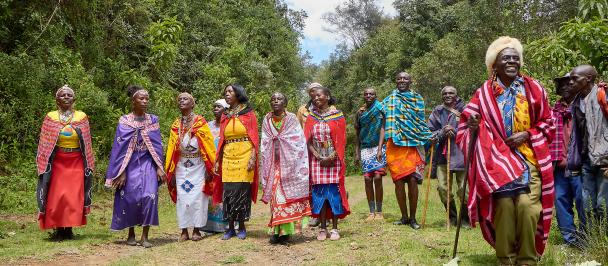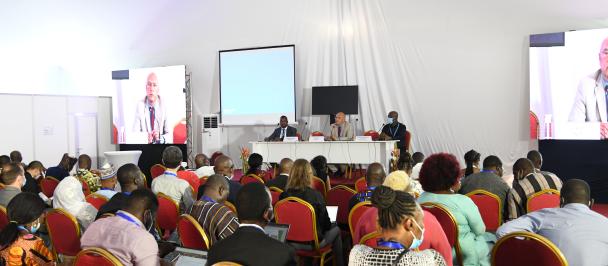Nigeria Gets Buzzing About a New Pollinator Strategy
January 30, 2023

As food insecurity caused by climate change and land degradation looms over Nigeria, most of the population still depends on agriculture for subsistence and employment. Given the vital importance of this sector for the country, the contribution of pollinators in ensuring agricultural productivity cannot be overstressed.
At present, there is little information on the status of pollinators in Nigeria. Yet, what is clear is that several threats – such as urbanization, deforestation, chemical pesticides and climate change – could drastically affect pollinator species’ habitats and their pollination service for food and crop production, as proven by research in other countries. In light of this gap, the country has been proactively taking action towards better conservation and management of pollinators since 2019 through the policy-science-practice dialogue group referred to as the “Nigeria Trialogue Working Group”.
Developing a national pollinator strategy
In line with the ongoing national effort funded under the BES Solution Fund towards developing a national strategy for pollinator protection and conservation, key stakeholders gathered in Abuja from 26 to 28 September 2022 to jointly frame the strategy’s theory of change. The Federal Ministry of Environment of Nigeria, the United Nations Development Programme Nigeria, BES-Net, Promote Pollinators (Coalition of the Willing on Pollinators) and the Naturalis Biodiversity Center collaborated in organizing the workshop, bringing together representatives from the science, policy and practice communities.
The three-day event was an exciting chance for participants to brainstorm, exchange knowledge and learn from each other. The overall focus of the workshop was to formulate a theory of change – a methodological framework that begins with identifying the long-term goals and works backwards to map out the interlinked outcomes, involving stakeholders and actions necessary for the attainment of the desired changes – and undertake a structured analysis of how to implement the strategy and maximize its impact.
The Theory of Change workshop has exposed me to the interconnectivity of activities and the various actors playing different roles towards pollinator conservation and management. The research carried out by scientists provides important data for policy formulation and practice and offers a good foundation for a pollinator-friendly strategy.Dr. Andrew Iloh, Researcher
The first day of the workshop was dedicated to the status review, with presentations on the state of pollinators and the ongoing conservation work in the country. Participants identified urbanization and land fragmentation, deforestation, monoculture, chemical pesticides, pathogens and climate change as the main threats to pollinators in the country. The workshop also emphasized the scarcity of national data on pollinators and their contribution to the economy, gross domestic product and food security. The second half of the day was dedicated to the co-creation of the impact statement. It answers the question: What do we want to jointly work towards regarding pollinators and pollination?
The second day focused on understanding the logical thinking process required to develop a theory of change and starting work on defining the outcomes, involved stakeholders and actions. On the third day, the participants further complemented the framework, divided into four pathways of change through which to enhance pollinator-friendly actions: (1) forestry, land degradation and climate change, (2) chemical and pesticides, (3) pathway awareness, knowledge, advocacy, policy and data and (4) beekeeping and apicultural practice. Pursued simultaneously, these pathways are expected to contribute to improved knowledge and practices in pollinator protection, which leads to increased pollination services, contributing to better agricultural productivity, food and nutrition security and livelihoods.
I have learned a lot from the workshop, particularly about promoting pollinator-friendly practices. As a farmer from River State, I plan to share the insights from the workshop with other farmers in the State to create awareness of adopting pollinator-friendly practices, such as avoiding the use of harmful chemicals that affect pollinators.Mr. Poye Akainy, Farmer
Translating the theory of change into action
Developing a theory of change is only one part of Nigeria’s journey towards sustainable pollinator management. The Nigeria Trialogue Working Group envisions the theory of change to contribute not only to the formulation of the national pollinator strategy but also to associated awareness and knowledge training, policy changes and community empowerment.
The need for a national strategy to reverse the trend has become evident in the context of the pollinators’ population decline. The main focus of the strategy will include:
- Awareness-raising at the highest level of government decision-making on pollinators
- Improved public awareness of the importance of pollinators in various aspects, such as ecosystems and environmental health, food security and biodiversity
- A national policy that would catalyse the development of a “National Bill on Pollinators” to enable pollinators to thrive and survive
- Mitigation and reduction in the use of hazardous pesticides, herbicides and agrochemicals in general
- Development of an implementation mechanism reinforced by an appropriate monitoring and evaluation framework to ensure compliance and impact
The implementation of the strategy will involve substantial collaboration among many stakeholders, from government bodies and the media to farmers and beekeepers, as well as large-scale companies engaged in chemical production.
The theory of change will exist as a living document and evolve along with Nigeria’s pollinator strategy. Plans are underway to increase pollinators’ data in Nigeria; for instance, assessments on pollinator populations and distributions will be carried out across three national parks (Kanji National Park, Cross-River National Park and Old Oyo National Park) with BES Solution Fund support. The results of these surveys will be used to adapt and refine the strategy and how it is implemented.
Most importantly, the co-created theory of change offers a shared roadmap for synergizing the knowledge and action of stakeholders from the fields of science, policy, practice and local communities – a vital step to creating nature-based solutions that holistically address the interrelated issues on pollinator conservation, biodiversity, land conservation and food production.
Pollinators are not only essential for food production and food security; they also help to maintain genetic balance and diversity between species. I have learned a lot from the Theory of Change workshop concerning the steps to protect pollinators and ensure that their services are maintained. Policy formulation is key to supporting the execution of the Theory of Change.Mrs. Adeyemi Hafsat, IPBES National Focal Point

 Locations
Locations

